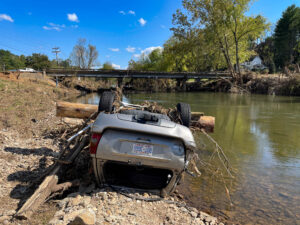
It usually is. Football season, you know. But this one was especially fine. Highs in the 70s and 80s, lows in the 50s or 60s. Clear skies, almost no wind. I rode my e-bike to stores and restaurants, rode it all around the city each weekend, discovering new routes, new places, and new strength in my aging legs.
It was too perfect.
It never rained. A trace amount was spotted at the Airport around Halloween, but Atlanta is a city of trees and we’re now in drought.
Few people talk about the drought because we did get a lot of rain in September, when Hurricane Helene came through. It was a dark and stormy night. The center of the storm ran east. It missed us. Around Augusta, of course, it tore a path of destruction that ran up through South Carolina’s Upstate and into the Smoky Mountains, where it dumped 20 inches of rain in Asheville, cutting it off from the world.

They were wrong.
Days later, another storm called Milton devastated the parts of Florida Helene missed. Yet a few weeks later all these places – Florida, Georgia, South Carolina, and North Carolina, voted unanimously for Republicans who pretend the climate crisis isn’t happening.
Why We Ignore It

This can turn a crisis into disaster without leadership. Generals are important because they make us face a common threat. We even give up our lives in the name of a larger cause.
But this does us no good in the climate crisis. Instead of focusing on our shared responsibility, we turn inward. When disaster strikes, we blame the government, the insurance companies, or immigrants.
This has always been true. Shakespeare wrote about it, a speech given to Thomas More and recited by Ian McKellen a few years ago for Marc Maron. “This is the stranger’s case, and this your monstrous inhumanity,” he concludes.
It’s clear that the War Against Oil can be won. We have the tools. I have been writing about it for 15 years, sometimes very optimistically. Just in the last year we’ve seen miracles of science, new cost-efficient solar panels, new designs for wind turbines, new materials for batteries, and new sources of lithium.
Yet we persist. Carbon dioxide levels are rising faster than ever before.
In elections around the world in 2024, with hurricanes raging, temperatures rising, and ice caps melting on every continent, we have gone to the polls and chosen instead to be led by monsters who will raise our drawbridges and pretend we can hide from the conflict destroying us.
There Is No Planet B
This, not Donald Trump, is the crisis of our time. When Earth warmed in the past, it was due to natural causes but, just as in our time, it caused mass extinctions, and after the ice caps melted the causes dissipated, the planet cooled, and life resumed.
That won’t be the case this time. It takes no more heat to melt a gram of ice, 334 joules, than to raise a gram of water’s temperature by 82 degrees. Celsius. That’s called a calorie. The world won’t just warm when the ice is gone. It will burn.
Yet when protestors try to focus on this reality by defacing paintings, we blame the protestors and ignore the cause. Still.
Are we doomed?










